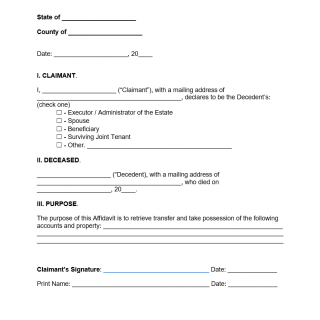Affidavit of Domicile
An affidavit of domicile is a legal document that verifies the primary residence of a deceased person. The form typically consists of a sworn statement that is signed by a legal representative of the deceased person's estate, such as an executor or administrator.
Important fields on the affidavit of domicile form include the name and address of the deceased person, the date of death, and the name and address of the legal representative who is signing the form. It is also important to include information about the deceased person's primary residence, such as the address and whether they owned or rented the property.
When compiling the affidavit of domicile form, you will need to gather information about the deceased person's primary residence and any other relevant details about their estate. You may also need to attach additional documents, such as a copy of the death certificate and proof of ownership or rental of the property.
Some common application examples of the affidavit of domicile form include using it to transfer ownership of assets, such as stocks or bonds, to the deceased person's heirs or beneficiaries. It can also be used to establish residency for tax purposes, or to claim life insurance or other benefits.
The benefits of completing an affidavit of domicile form include providing legal verification of the deceased person's primary residence, which can help to avoid legal disputes and ensure that their estate is distributed according to their wishes. However, there are also some challenges and risks involved, such as the potential for disputes over the deceased person's residency or ownership of property.
Related and alternative forms to the affidavit of domicile include the affidavit of heirship and the small estate affidavit. The main difference between these forms is the purpose for which they are used and the specific information that is required.
The affidavit of domicile form can have significant implications for the future of the deceased person's estate and their heirs or beneficiaries. It is important to ensure that the form is completed accurately and in compliance with all relevant laws and regulations.
Once completed, the affidavit of domicile form should be submitted to the appropriate legal or financial institutions, such as a bank or brokerage firm. It should also be stored in a safe and secure location, such as a safe deposit box or with an attorney or estate planner.

